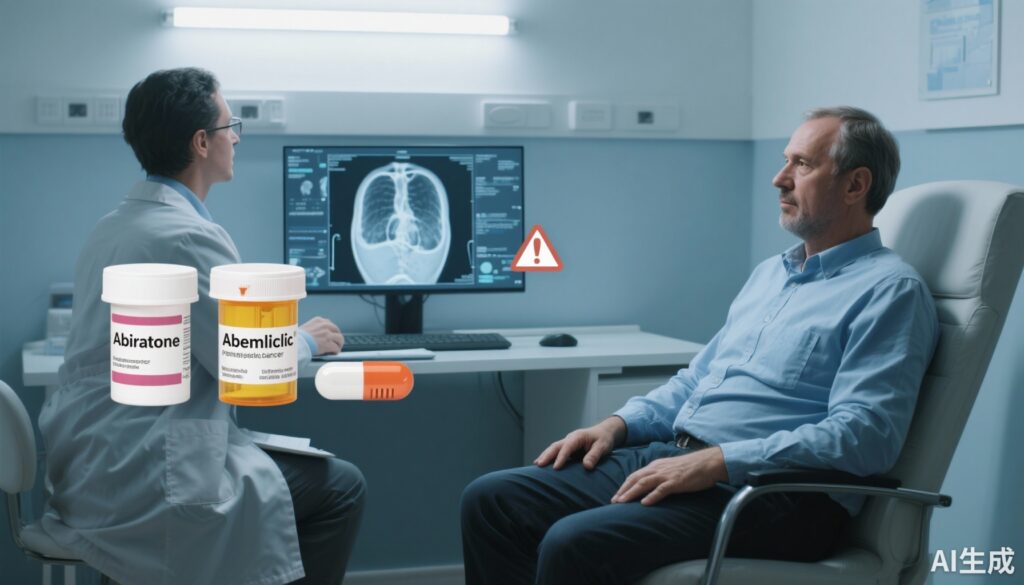Highlights
– The randomised, double-blind, placebo-controlled phase 3 CYCLONE 2 trial evaluated abemaciclib plus abiraterone versus abiraterone alone in metastatic castration‑resistant prostate cancer (mCRPC) and did not meet its primary endpoint of investigator‑assessed radiographic progression‑free survival (rPFS).
– Median rPFS was 22.0 months with combination therapy versus 20.3 months with abiraterone alone (HR 0.83, 95% CI 0.62–1.11; p=0.21), a non‑significant difference.
– The combination increased hematologic toxicity (notably anaemia and neutropenia) and liver enzyme elevations; three treatment‑related deaths from interstitial lung disease occurred in the combination arm.
Background: clinical context and unmet need
Metastatic castration‑resistant prostate cancer (mCRPC) remains a leading cause of cancer mortality in men worldwide despite therapeutic advances. Targeting androgen receptor (AR) signalling with agents such as abiraterone acetate (an inhibitor of CYP17A1) and enzalutamide improves outcomes in many patients, but resistance invariably develops and survival benefits are modest in the refractory setting. Identifying rational combination approaches that delay progression without unacceptable toxicity is a priority.
Cell‑cycle dysregulation—particularly through the cyclin D–CDK4/6–RB pathway—is common across cancers, and CDK4/6 inhibitors (abemaciclib, palbociclib, ribociclib) have transformed management in hormone receptor–positive breast cancer. Preclinical prostate cancer models and early clinical observations suggested that simultaneous inhibition of AR signalling and CDK4/6 could produce additive or synergistic antitumour effects; CYCLONE 2 was designed to prospectively test this hypothesis in mCRPC.
Study design and methods
CYCLONE 2 was a multinational, randomised, double‑blind, placebo‑controlled phase 3 trial (NCT03706365) conducted at 89 centres across 12 countries. Eligible adults had histologically confirmed adenocarcinoma of the prostate with metastatic disease and radiographic or PSA progression on continuous androgen deprivation therapy. Prior abiraterone, apalutamide, enzalutamide, darolutamide, or any CDK4/6 inhibitor were exclusionary. Prior docetaxel for castration‑sensitive disease was permitted.
The trial comprised a four‑arm safety and dose‑finding lead‑in (part 1) to establish a recommended phase 2 dose, followed by two randomised parts (parts 2 and 3). In all parts, patients received abiraterone 1000 mg daily plus prednisone/prednisolone 5 mg twice daily and were randomised to receive abemaciclib (150 mg or 200 mg orally twice daily in the lead‑in; 200 mg twice daily selected as the recommended dose) or matching placebo. Randomisation was stratified by prior docetaxel, measurable disease, and type of progression. The primary endpoint was investigator‑assessed radiographic progression‑free survival (rPFS) analysed in the intention‑to‑treat population. Safety analyses included any patient receiving at least one dose of study drug.
Key findings
From Nov 26, 2018 to July 20, 2022, 515 patients were screened and 393 randomised: 206 to abemaciclib plus abiraterone and 187 to placebo plus abiraterone. Median age was 70 years. The recommended phase 2 dose selected was abemaciclib 200 mg twice daily.
Primary outcome: radiographic progression‑free survival
The primary endpoint was not met. rPFS events occurred in 92 of 206 (45%) patients in the combination arm and 95 of 187 (51%) patients in the abiraterone‑alone arm. Median rPFS was 22.0 months (95% CI 19.3–27.5) in the abemaciclib plus abiraterone group versus 20.3 months (95% CI 16.5–24.4) in the placebo plus abiraterone group (hazard ratio [HR] 0.83, 95% CI 0.62–1.11; p=0.21). The point estimate favoured combination therapy numerically but did not reach statistical significance and the confidence interval crossed unity.
Secondary and exploratory outcomes
The trial report emphasises the primary rPFS result; secondary endpoints (overall survival, objective response rate in measurable disease, PSA responses, time to symptomatic progression) were either not improved or not presented as showing clinically meaningful benefit in the primary publication. Median follow‑up was adequate (median 26.3 months in the combination arm and 25.6 months in the control arm) to capture rPFS events for the study population.
Safety and tolerability
Toxicity was greater with the addition of abemaciclib. Grade ≥3 adverse events that were more frequent in the combination arm included anaemia (14% vs 4%), neutropenia (13% vs 1%), and ALT (alanine aminotransferase) elevation (9% vs 6%). Serious adverse events occurred in 44% of patients receiving the combination versus 37% in the control arm. Importantly, there were three treatment‑related deaths due to interstitial lung disease (ILD) reported in the abemaciclib plus abiraterone arm. These fatal pulmonary events underscore a potentially serious safety signal that must be weighed against any small efficacy signals.
Interpretation and clinical implications
CYCLONE 2 shows that dual targeting of CDK4/6 and AR signalling with abemaciclib plus abiraterone does not meaningfully extend rPFS compared with abiraterone alone in an unselected population of men with mCRPC. Although the combination produced a numerical rPFS advantage (median 22.0 vs 20.3 months), the difference was not statistically significant and was accompanied by increased toxicity, including rare but fatal pulmonary events.
Several practical implications follow:
1) Lack of benefit in an unselected population: The negative trial outcome argues against routine combination use of abemaciclib with abiraterone for unselected mCRPC patients. This contrasts with the clear activity of CDK4/6 inhibitors in hormone receptor‑positive breast cancer, highlighting disease‑specific biology and resistance mechanisms.
2) Safety considerations: The higher rates of haematologic toxicity and the occurrence of ILD warrant caution. In the absence of clear efficacy, incremental toxicity is unacceptable for most patients.
3) Need for predictive biomarkers and patient selection: CDK4/6 inhibitors may still have a role in molecularly selected subsets (for example, tumours with intact RB and cyclin D pathway activation), but this requires prospectively validated biomarkers. Future trials should incorporate molecular stratification or enrich for populations most likely to derive benefit.
4) Combination strategy complexities: The biology of resistance in mCRPC is heterogeneous (AR amplifications, splice variants such as AR‑V7, lineage plasticity, neuroendocrine differentiation) and may blunt the impact of cell‑cycle inhibition. Sequencing, dosing, and interactions with androgen‑depleting therapies must be optimized.
Study strengths and limitations
Strengths include a robust randomized, double‑blind design, international multi‑centre participation, appropriate stratification, and adequate follow‑up. The lead‑in safety/dose‑finding component is also a methodological strength.
Limitations include the absence of robust biomarker‑driven selection or reported subgroup analyses that could identify patients more likely to respond. Investigator‑assessed rPFS—while standard—can be subject to assessment variability; independent central review is sometimes preferred to mitigate bias. Finally, the inclusion criteria excluded patients previously treated with abiraterone or other AR‑axis inhibitors, which shapes generalisability to contemporary practice where sequencing and prior exposures vary.
Expert commentary and mechanistic perspective
Why did a biologically plausible combination not translate to clinical benefit? Several mechanistic explanations are possible. Prostate tumours that have escaped AR dependence or have concurrent molecular alterations (eg, RB loss, TP53 alterations, lineage plasticity) may not be sensitive to CDK4/6 blockade. Moreover, interactions between abemaciclib pharmacodynamics and androgen biosynthesis pathways, or overlapping toxicities, could limit dose intensity and duration of CDK4/6 inhibition in practice.
These findings emphasise that preclinical synergy does not guarantee clinical success; careful patient selection, biomarker incorporation, and an intimate understanding of resistance biology are prerequisites for successful combination strategies in mCRPC.
Conclusion and future directions
CYCLONE 2 demonstrates that adding abemaciclib to abiraterone does not improve rPFS and increases toxicity in an unselected population with mCRPC. The trial reinforces the need for precision approaches: future research should prioritise molecular stratification (eg, RB status, cyclin D pathway activation), earlier integration of translational endpoints, and exploration of combinations with agents targeting other resistance pathways (eg, DNA repair defects, neuroendocrine transition mechanisms, immune modulators) where biologic rationale exists.
From a clinical standpoint, abemaciclib should not be combined with abiraterone outside of a clinical trial for routine treatment of mCRPC at present. Investigators and sponsors should report detailed biomarker and subgroup analyses from CYCLONE 2 to inform whether any patient subsets derived benefit and to guide rational design of subsequent studies.
Funding and trial registration
The CYCLONE 2 trial was funded by Eli Lilly. ClinicalTrials.gov identifier: NCT03706365.
References
1. Smith M, Piulats J, Todenhöfer T, et al; CYCLONE 2 investigators. Abemaciclib plus abiraterone in patients with metastatic castration‑resistant prostate cancer (CYCLONE 2): a randomised, double‑blind, placebo‑controlled, phase 3 trial. Lancet Oncol. 2025 Nov;26(11):1489‑1500. doi: 10.1016/S1470-2045(25)00475-9 IF: 35.9 Q1 . PMID: 41167216 IF: 35.9 Q1 .
2. de Bono JS, Logothetis CJ, Molina A, et al. Abiraterone and increased survival in metastatic prostate cancer. N Engl J Med. 2011;364(21):1995‑2005.
3. Ryan CJ, Smith MR, de Bono JS, et al. Abiraterone acetate for treatment of metastatic castration‑resistant prostate cancer: final overall survival analysis of COU‑AA‑302. N Engl J Med. 2013;368(2):139‑148.
4. Malumbres M, Barbacid M. Cell cycle, CDKs and cancer: a changing paradigm. Nat Rev Cancer. 2009;9(3):153‑166.
Selected further reading: reviews and guideline summaries on mCRPC management and CDK4/6 biology are recommended for clinicians seeking deeper context.



